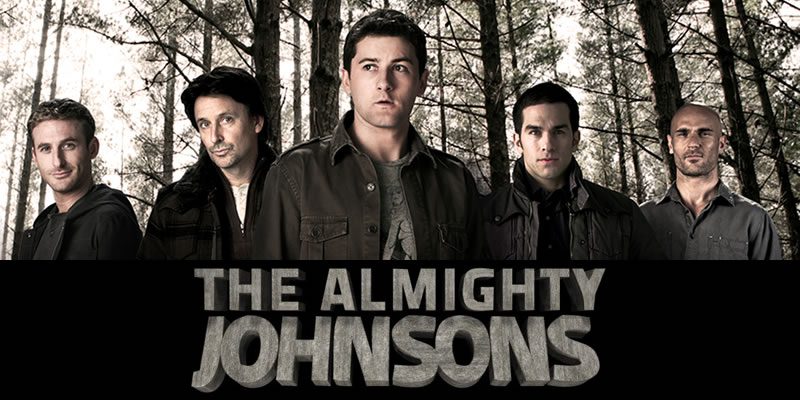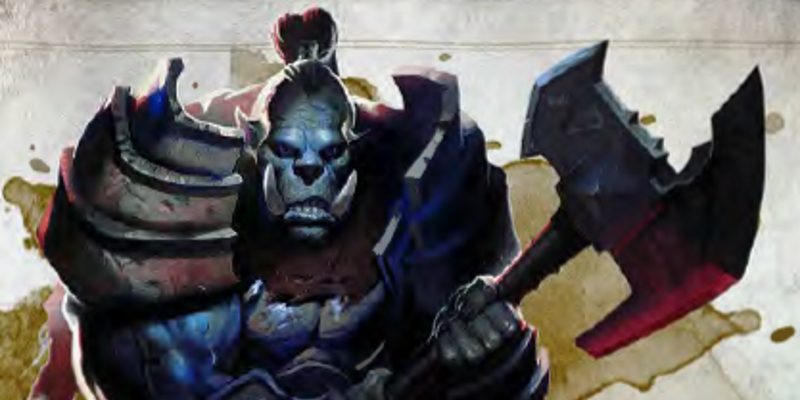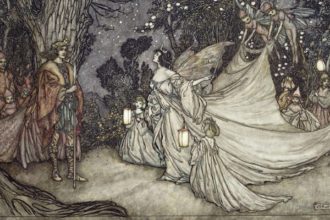The Almighty Johnsons, The Power of Self, and the Reverse Warlock

I had a conversation the other day regarding clerics, warlocks, and the nature of other-directed character advancement. It hadn’t ever been something I really considered, but it was a very important issue to the people I was speaking to at the time. This got me thinking about a show out of New Zealand called The Almighty Johnsons, and how the show addressed and answered this very question during its run from 2011-2013.
Oh My God, Odin.
New Zealand has been quietly kicking ass in the entertainment world for a while. While the 80’s and 90’s have some memorable and fantastic films, Goodbye Pork Pie, Utu, Meet the Feebles, Heavenly Creatures, The Frighteners, the industry doesn’t really explode until the 2000’s, thanks in large part to Peter Jackson’s foray into Tolkien’s works. The 2000’s sees such works as the Whale Rider, The World’s Fastest Indian, Eagle vs. Shark, Bridge to Terabithia, and 30 Days of Night, all in addition to the Lord of the Rings films and King Kong. In the last two years, we’ve also gotten Housebound and the amazing What We Do in the Shadows, which I will undoubtedly write about in the future.
This is just in the movie world, of course. On television we got the 2007 HBO musical-comedy show Flight of the Conchords. While this isn’t precisely a New Zealand show, it is about New Zealanders adrift in New York. It is also one of the most incredible and underrated shows to ever appear on HBO. I can’t say enough good things about the show. We’ve also recently been lucky enough to get the full run of The Almighty Johnsons on Netflix. There was a version aired on Syfy in the US, but you should throw the Syfy version in the garbage where it belongs. The show’s language and nudity is crucial to the story told. Not in a Game of Thrones way, but in an actual real way. The show is about Norse gods, after all. Would you expect less?
The show’s is ostensibly about a family called the Johnsons who are from Norsewood, New Zealand. The family’s secret is they are descended from Norse gods. When they turn 21, the powers of the Norse gods manifest. However, the powers of the gods are not fully theirs to command. It is up to Axl, who is the reincarnation of Odin, to seek out his immortal bride Frigg and join with her, in order for the powers of the gods to return in full. They are, of course, opposed in this endeavor. First by goddesses who did not appreciate the old hierarchy of the pantheon, then by Loki, and also by a rival pantheon. In true Norse tradition, while these outside threats are complications to overcome, most of the trouble comes from themselves. While the show is rich in narrative, the core thrust of the show is simple; the Johnsons are a bunch of morons.
The Johnsons can’t be bothered to get their shit together for even a second, focusing entirely on themselves and their family. This is not only a great analogue for the Norse pantheon, but also a rich bed for comedy and drama. The Johnsons constantly jump to conclusions, come up with half-cooked schemes, refuse to do reasonable things, get tricked by the other gods, and embroil themselves in terrible relationships as often as possible. Even more interesting, the show doesn’t really go for the easy depictions. Sure, Axl, the youngest brother, is Odin, but his oldest brother is Ullr, god of games and the hunt, his second oldest brother is Hodr, god of all things cold and dark, and his closest brother is Bragi, god of poetry. His grandfather is Baldr, god of new beginning and rebirth, his mother was Freyja, goddess of fertility, and his father was Njordr, god of storms and sailing.
While Loki plays a big role, and heavy hitters like Thor show up, much of the rest of the cast reflects this deeper layer of Norse mythology. The mythology isn’t precise, and the gods are often open for interpretation, but it’s definitely interesting. It’s refreshing and makes a lot of sense given the narrative of the show. The show weaves mythic with modern with ease, and it is rarely wasteful. It’s a very, very tight show. Even with the strangeness of the third season, when it was canceled and then renewed with different people in charge, it manages a really strong finish.
The fact that the Johnsons are a bunch of idiots throughout the run of the show fills me with glee. Even when they decide to stand up, take action, and seize control of their own destiny, they screw it up. They ignore subtle hints entirely, and lock on any small discovery as a supreme act of fact. In their search for Frigg, everyone is Frigg. The best part is when other people get swept up in it, only to realize it’s utter stupidity. The plans almost never work out, because the Johnsons can’t get out of their own way.
It sounds like it should be frustrating, but it’s not. It’s hilarious in the way of the best comical myths. Situations are presented to engender growth, and sometimes the characters succeed in some facets, and yet fail in others. Everyone abuses their powers, except for poor Hodr, who can’t control them, and Odin, who can’t seem to consistently use them at all because he’s not really Odin-like enough for Odin.
The other gods are much more in tune with their divine natures. They wield their powers with some degree of control. They make it their business to learn more about themselves, delve into Norse history, and keep abreast of the other gods and goddesses. The Johnson boys are everyone who has ever been too lazy to study, and doesn’t understand why they get bad grades. Better, they think they are smarter and more clever than everyone else, but they just are not. Again, it’s not frustrating or infuriating, it’s just hilarious.
One of the more interesting things in the show is the relationship between Hodr and Hel. It’s an absolutely pitch perfect portrayal of an abusive relationship, enablement, and rationalization. It also is a great example of how such a relationship affects the loved ones of the people involved in the relationship. Further, it manages to capture the strange horrific voyeurism people often feel when they learn of such a situation. It really is quite phenomenal from start to finish, and manages to also have interesting to say about the cult of personality.
Seriously, the show is awesome. Check it out. All three seasons are still on Netflix.
The Power of Self
In speaking with people regarding 5e, one of the complaints catching me most off-guard was regarding the lack of personal power for clerics and warlocks. All other classes grow more powerful through their own actions, or are otherwise able to direct and shape their power without relying upon others. Clerics and warlocks are the exception to this story direction, and it is entirely conceivable the player could lose their connection to the divine or arcane being empowering them. I personally vote this as good story opportunity, but obviously everyone need not share my opinion.
Still, it’s an interesting point to consider, even if I don’t agree with the core principle. Giving yourself over to a higher power is a core point of many religions, after all, so it makes some sense given a particular perspective. In discussions, people against the concept in general were more ok with cleric, simply because of the precedent. I am not sure I necessarily agree with this either. Warlock is essentially pitched as an arcane cleric, which is pretty rad, all things considered. However, if you are ok with the core cleric concept, you should be ok with the core warlock concept. As usual, it just comes down to what people know and are most comfortable with. After all, eldritch blast warlocks carry that sentiment forward.
I’m not entirely certain where the disconnect is regarding warlock. It’s the quintessential Faust story. A learned scholar makes a pact with a supernatural being in exchanges for power, wealth, and pleasure. The scholar then has to struggle against his supernatural patron while simultaneously serving the patron to the best of his ability. It’s all classic stuff. Like really classic stuff. Goethe classic stuff.
There is just something about not being the source of your own power. Self-sufficiency is a tricky beast, however. It’s easy for a class to turn from self-sufficient into powerhouse. I don’t think anyone would argue Battlemaster fighter or Oath of the Ancients paladin isn’t incredibly strong. Paladins aren’t tied to a god any longer, but instead are placed under a geas of sorts to enforce their codes, so they aren’t other-directed in the same way clerics or warlocks are in this edition. This is an interesting twist on paladin, so I’m all for it. They feel a lot different, to me, because of this change. Anyway, I digress.
The point I am making here is the basic nature of this other-direction makes some people view the classes as not as desirable as their counterparts. People want to be the captains of the ship of their own destiny. I’ve been thinking about this for a while, as it is definitely not an argument I would make. I started thinking more and more about The Almighty Johnsons, and how the show solves this problem by its very nature.

The Reverse Warlock
In The Almighty Johnsons, the gods, or mythological creatures such as frost giants and dwarves, exist within the characters. Another good example would be Rasputin from Hellboy. Every time he dies, his Old God lives within him a little more, and he carries it around with him at all times. I like The Almighty Johnsons a bit better, simply because it shows the characters are responsible for their own advancement, and having a supernatural nature doesn’t really do much for them if they are lazy gits.
Sure, they get some basic power, such as being a level one warlock or cleric, for example, but only by seeking out more wisdom, going on quests, and overcoming challenges are they able to gain greater control over their powers. In some cases, they must overcome their basic selfish natures and act outside their own interests in order to advance their powers. In all cases, these are character-driven actions allowing them to increase their efficacy.
It still requires something of other-direction, but it reduces it from cleric level to sorcerer level. I haven’t heard anyone complain about a magical bloodline being the source of power, though admittedly I haven’t even google-searched such a thing. It’s the internet, I’m sure I could find it. Still, it’s likely less objectionable simply because the blood is already flowing through you, and while it was from your ancestors you gained power, it now exists within you. You determine how it expands and gets expressed.
From a story perspective, it makes an interesting tale. The being in question must give themselves over to mortal control, though it can provide prompts when needed, preferably based on historical context. However, the gods can’t leave their hosts willy-nilly, and they are with the reincarnations until the bitter end, one way or the other. It’s definitely a big shift from the way the cosmos plays out in the traditionally outlined texts, but it’s something to consider as an alternative, should you need to provide one.





